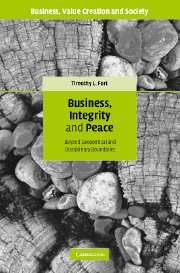Book contents
- Frontmatter
- Contents
- List of tables
- Foreword
- Special acknowledgment
- Acknowledgments
- Notes on citation style
- Part One Peace Through Commerce
- 1 The times and seasons of corporate responsibility
- 2 Red (and not so red) in tooth and claw
- 3 Tales of the firm
- 4 Honest Brokers
- Part Two Total Integrity Management
- Index
3 - Tales of the firm
Published online by Cambridge University Press: 19 January 2010
- Frontmatter
- Contents
- List of tables
- Foreword
- Special acknowledgment
- Acknowledgments
- Notes on citation style
- Part One Peace Through Commerce
- 1 The times and seasons of corporate responsibility
- 2 Red (and not so red) in tooth and claw
- 3 Tales of the firm
- 4 Honest Brokers
- Part Two Total Integrity Management
- Index
Summary
Several years ago, I consulted with a family-owned firm that any ethicist would love. The company was the leader of its industry, it treated its employees extremely well and it was deeply engaged in the well-being of its community. The example of it as a deeply engaged citizen of its community is one that I also saw replicated in my law practice in the rural Midwest ranging from car dealers to banks to insurance firms to doctors. These businesses could be dismissed as the nostalgic residue of small communities left behind in a global age. Yet big companies too, sometimes, see their employees as human beings with creative intelligence and their communities as neighbors rather than assets to be leveraged. Moreover, some business people see their work specifically as a way to dampen conflict. For instance, Greek and Turkish Cypriot businesses have engaged in dialogue for the peace settlement of Cyprus's conflict through economic cooperation. Businesses were active in modeling peace agreements in El Salvador. Tourism interests in Israel and Palestine work together to promote the region's tourism through cooperation; similar work fostering interethnic cooperation occurs in Nigeria, Northern Ireland, and Sri Lanka.
These kinds of companies practice a theory of the firm not typically addressed today by the profit-only approach to business. As we saw in Chapter 1, this is not necessarily surprising because the law is open to different ways of running a business.
- Type
- Chapter
- Information
- Business, Integrity, and PeaceBeyond Geopolitical and Disciplinary Boundaries, pp. 77 - 115Publisher: Cambridge University PressPrint publication year: 2007

